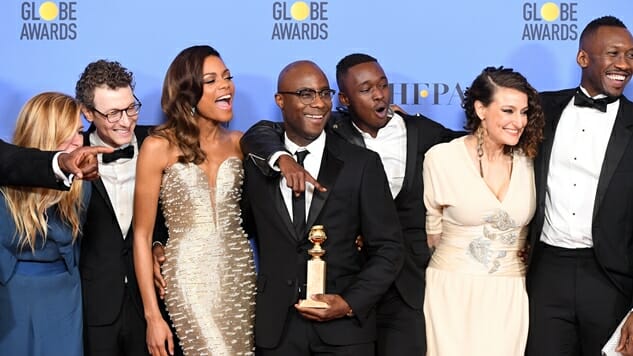In Moonlight, a Silver Lining Emerges
Photo by Kevin Winter/Getty
The sound and fury of 2016 has signaled both a lash against and a celebration of inclusion. In cinema, thankfully, it has been the latter.
That is where respite can be found from the accelerating frenzy of the world and U.S. politics. Not to be mistaken, not entirely at least, as an opiate in the Marxian tradition. Film on the contrary has been weaponized in times of political crises. This lull—or indulgence in optimism, if you will—heralding the broadening of film and its social function has been granted by Barry Jenkins’ award-winning independent feature Moonlight. Much buzz has surrounded the mystique of the film and its queer black theme, especially contrasted amidst the current doldrums of Hollywood. Its popularity has already reached a fevered pitch, hailed as the coming-of-age, soon-to-be cultural touchstone film of 2016—and perhaps of this decade. The effusive praise doled out by critics; the film’s commercial achievement; its deeply hyper-stylized cinematic lyricism—by most objective measures, Moonlight has already crossed the threshold into the annals of cinematic history. Deservedly so.
Told in a three-part sequence, Moonlight chronicles a queer young Black man named Chiron in his troubled passage from childhood to adolescence and, finally, to adulthood. His story is set against the realities of material deprivation in an economically depressed Miami and American south—harried by drugs and a punitive carceral regime. Throughout the film, the aesthetics of anguish are rendered in vibrant colors and beckoning visuals of the ocean, of the deep blue that is poetically implicit in every scene and embodied in the flesh.
In this setting, merciless, unrelenting bigotry is perpetrated with impunity against Chiron while many (even his detached mother) turn a blind eye. What opens the film is the child Chiron, alone, running, running with a group of youngsters on his tail verbally assailing him. There is no solace for Chiron, no break from the torment. Lingering shots and periods of profound silence conjure only a nostalgic mournfulness. The film’s score is melancholic. Even Chiron’s teenage years are spent on the realization that everything has become a portent of violent misfortune. Finally, the film’s dénouement suggests a coming-of-age, when adult Chiron reconciles with his past through forgiveness and tacit intimacy.
Along with its rapid accretion of acclaim, the film’s late October limited opening totaled impressive earnings of $402,075. This averages about $100,519 per-location in four theater venues in both Los Angeles and New York City—the highest of any film release in 2016. Later at the American Film Institute, Jenkins even noted that Moonlight’s post-elections sales might indicate underlying shifts in attitudes. The film’s wide release during the November 18th weekend in over 650 theaters accrued $1,488,740 to its box office returns, which raised the film’s overall theatrical earnings ranking to 11th. But why would the box office returns have increased after this particular U.S. election? As of February 1st, 2017, the total earnings reached $18,246,283, while its starting production budget was a mere $5 million. These commercial aspects, combined with the effects of political movements made it clear that the film bears kinship with the social milieu into which it was released.
-

-

-

-

-

-

-

-

-

-

-

-

-

-

-

-

-

-

-

-

-

-

-

-

-

-

-

-

-

-

-

-

-

-

-

-

-

-

-

-








































